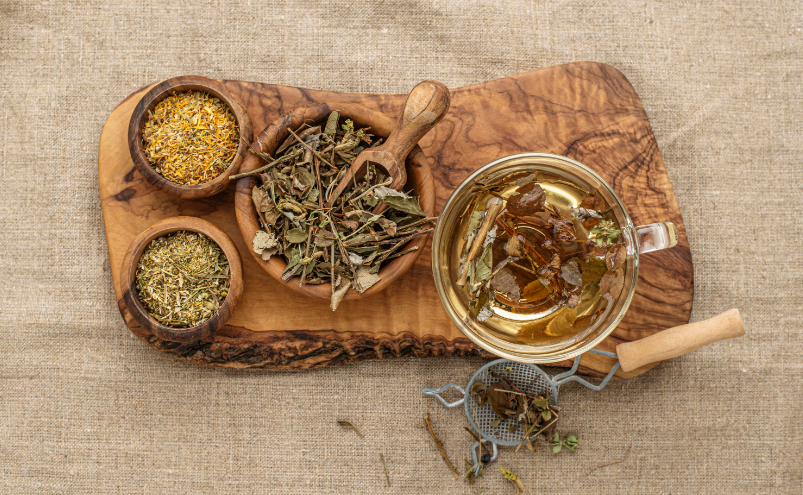Tea is more than just a way to gain more hydration. In some parts of the world there is an entire culture surrounding it with rituals on how to consume it and extremely precise methods for properly brewing it. The world of science reveals that, regardless of whether or not it is an inherent part of our culture, tea definitely deserves our close attention.
In fact, it's our third month dedicated to talking about teas. A discussion of teas is not complete, however, without touching on herbal teas.
The truth is that herbal tea isn't technically a tea. Strictly speaking, tea only refers to those infusions made from leaves of the Camellia sinensis plant we studied the past two months.
Herbal tea is a blend of herbs, flowers, fruits or spices. Sometimes, however, these ingredients are combined with actual tea leaves of the Camellia sinenis plant (i.e. peach or lavender combined with white tea or peppermint combined with green tea).
If you're inexperienced when it comes to tea, herbal teas are a great starting point since many of their flavors are familiar, delicate, not overpowering, and often even naturally (but subtly) sweet.
FLAVOR PROFILE: The flavor depends on the herb, fruit, or spice used. Herbal teas can range from delicate and neutral to robust or bitter. Some may be sweet or fruity. Some great herbal teas you'll find on many store shelves inlude chamomile, lavender, turmeric, hibiscus, ginger, pepperment, or rooibos.
RECIPE: Again, this truly depends on the type of herbal tea. Most, however, are brewed with close-to-boiling point water and steeped anywhere from 3 to 15 minutes to extract flavor.
SEVERAL RESEARCHED HEALTH BENEFITS:
CHAMOMILE - A member of the daisy family, this is one of the oldest, most widely used medicinal plants, especially for relaxation and better sleep. It is suggested that its medicinal properties come from terpenoids and flavonoids released from its dried flowers.
Some health conditions that chamomile is used for include insomia, inflammation, allergies, GI issues, menstrual disorders, and wounds, to name a few. Chamomile has recently been studied for promising antidepressant and anxiolytic (anti-anxiety) effects.
A fascinating study published in Life Sciences found that chamomile, which has long been used for its anti-inflammatory activity, may work the same way many NSAIDS work. This study suggests chamomile treatment has potential in preventing inflammation and cancer.
PEPPERMINT - Let's take a look at another familiar herbal tea flavor. Peppermint tea's health benefits are suggested to come from phenolic compounds in the leaves (rosmarinic acid, hesperidin, luteolin, and eriocitrin). Human studies suggest potential benefits for the respiratory and gastrointestinal tract. Several studies suggest this tea is also effective in reducing abdominal pain, gas, and diarrhea in Irritable Bowel Syndrom (IBS).
HIBISCUS - Behold what studies have found to be an effective way to lower blood pressure. Yes, one exciting study found daily consumption of hibiscus tea lowered blood pressure in pre-hypertesive and mildly hypertensive adults.
SAFETY: Remember to notify your healthcare provider of what herbal teas you consume since some may interfere with certain prescription medication - some enhance their effects and some inhibit their effects, both of which can be a probem if not properly monitored.
A reasonable amount of daily consumption may range anwhere from 2-4 cups.
It is especially important to proceed with care and caution during pregnancy and lactation or when serving children herbal tea.
References
Srivastava, J. K., Shankar, E., & Gupta, S. (2010). Chamomile: A herbal medicine of the past with bright future. Molecular medicine reports, 3(6), 895–901. https://doi.org/10.3892/mmr.2010.377
Amsterdam, J. D., Shults, J., Soeller, I., Mao, J. J., Rockwell, K., & Newberg, A. B. (2012). Chamomile (Matricaria recutita) may provide antidepressant activity in anxious, depressed humans: an exploratory study. Alternative therapies in health and medicine, 18(5), 44–49.
Srivastava, J. K., Pandey, M., & Gupta, S. (2009). Chamomile, a novel and selective COX-2 inhibitor with anti-inflammatory activity. Life sciences, 85(19-20), 663–669. https://doi.org/10.1016/j.lfs.2009.09.007
Chang SM, Chen CH. Effects of an intervention with drinking chamomile tea on sleep quality and depression in sleep disturbed postnatal women: a randomized controlled trial. J Adv Nurs. 2016;72(2):306-315.
McKay, D. L., & Blumberg, J. B. (2006). A review of the bioactivity and potential health benefits of peppermint tea (Mentha piperita L.). Phytotherapy research : PTR, 20(8), 619–633. https://doi.org/10.1002/ptr.1936
Herbal remedies for dyspepsia: peppermint seems effective. (2008). Prescrire international, 17(95), 121–123.
McKay, D. L., Chen, C. Y., Saltzman, E., & Blumberg, J. B. (2010). Hibiscus sabdariffa L. tea (tisane) lowers blood pressure in prehypertensive and mildly hypertensive adults. The Journal of nutrition, 140(2), 298–303. https://doi.org/10.3945/jn.109.115097

























